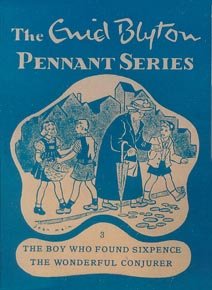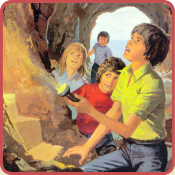
The Enid Blyton Pennant Readers 3

Book Details...
First edition: 1950
Publisher: Macmillan
Cover Art: Jean Main
Illustrator: Eileen A. Soper
Category: The Enid Blyton Pennant Readers
Genre: Mixed
Type: Readers
Publisher: Macmillan
Cover Art: Jean Main
Illustrator: Eileen A. Soper
Category: The Enid Blyton Pennant Readers
Genre: Mixed
Type: Readers
On This Page...
Reprints
- The Boy Who Found Sixpence
Story: Specially Written - The Wonderful Conjurer
Story: Specially Written

It's Benny's lucky day because he's just seen something in the gutter. It turns out to be a sixpenny piece and in the days when this tale was created, sixpence was definitely worth picking up and it doesn't take the boy long to decide what to buy with his sudden wealth. Benny's a gardening enthusiast with his own little plot in which he grows lettuces and radishes so what better than to purchase another trowel, seeing his old one is broken.
He puts the coin into his pocket without thinking that someone may have lost it and just as he's setting off, young Sally appears and she's crying. Dabbing her eyes with a hanky, she examines the ground near Benny's feet making it fairly obvious who owns the sixpence. A look at the picture indicates that Benny resembles the normal, kind-hearted, Enid Blyton/Eileen Soper child — but is this a false image? Instead of giving Sally her sixpence, the boy says nothing. Sally wipes her eyes again and tells Benny the money was given to her so that a lettuce could be purchased for dinner.
"Mummy will scold me dreadfully and call me a baby," says poor Sally. "I do so hope I find it."
Benny still says nothing and just watches the little girl moving on down the footpath looking everywhere for her lost coin. He knows he should give it back but as a new trowel is badly needed he runs off to the shop and acquires an excellent one. He'll use it this very afternoon, so he races home but when digging in the garden later on he doesn't feel too happy about what's taken place. Has Sally's mother scolded, or even smacked the girl and sent her to bed? He's feeling quite awful now because Sally shares her sweets and asks him to tea, and she always plays the games he wants to play.
The tea bell rings and Benny goes indoors to wash his hands. Mother tells him she'd just been out for a walk and met little Sally Jones who was looking sad because her mother had been very cross when she lost a sixpence. Benny goes red, and suggests someone may have found it.
"Finding is keeping, isn't it, Mummy?" he says (hopefully).
His mother is surprised and tells him it's certainly not. That's a very dishonest thing to say, and she reminds Benny that if he discovered anything of value in the road, he'd bring it to her at once ... wouldn't he? This causes her son to turn an even brighter red and he realises the time has come to own up, which he does there and then. Mother says he should have told him long before and that he must return the sixpence to Sally immediately.
Unfortunately that's going to be a little difficult, but a solution is found. It's quite an innovative one and, reading back, the reader might be able to work out what it is.
The Wonderful Conjuror
Enid Blyton often used the Italian connection when naming her show business characters, so there's Ravelini, Phillipino, and of course Galliano.
This particular story has a conjuror in it and he's named 'Ricardo.' The boys in Mr. Brown's class are very excited when they learn he's due in town because a magic show is well worth seeing. Alan trusts they'll all be allowed to attend the performance despite their teacher not being in a very good mood lately. Mr. Brown tends to think his boys are quite rude and ill-mannered, but as he's always expressing his annoyance in that respect, a hope still exists.
One might think the show would be held in the evening or perhaps at the weekend but Riccardo 's booked for what looks like a one-only performance, and that'll be on Wednesday afternoon, which means the boys will need time off. Unfortunately, they're out of luck because Mr. Brown, desiring to use the conjuror's visit as a means of blackmailing his class into improving their manners, refuses point blank to let them attend the performance. Apparently a complaint has just come in from a person whose bag was upset when a pupil from Mr. Brown's class had collided with her and then rushed off without offering an apology. The perpetrator is asked to stand up, but no one does.
Mr. Brown also has a comment to make about pupils pushing commuters aside to get onto the bus, and he sums up by telling them he's never seen such a bad-mannered class in his life. The boys file out gloomily and Tom reinforcing the teacher's remarks, says that some members of the class do let the school down by behaving badly in the street, so they can only hope no more complaints are made or the boys might have to miss cricket as well. Lennie has a suggestion,
"Why don't we try a spot of good manners and politeness, then Mr. Brown might let us go to the show?"
Alan pours cold water on that by telling him people don't write to a school when they perceive good manners; they just complain when experiencing any bad behaviour. The boys set off home. Alan has to catch a bus and when he boards it (remembering not to push his way in) he sits down and the vehicle moves off to collect more passengers at the next stop. Alan recalls what his mother has often said,
"I'm always proud of a boy who gives others his seat in the bus or helps anyone, and I hope you will remember that."
Alan likes doing what's asked of him so he gets up and offers his seat to a white-haired man who dutifully thanks him and says it's nice to see a boy with good manners. A day or so later day on his way to afternoon school, Alan raises his cap to an elderly lady and helps her across the street. There's a picture of him performing his good deed and, as befits the Blyton era, we can see a cart with horses in the background. Coincidentally, the man to whom he'd given his seat on the bus appears once again because the woman Alan has just assisted is none other than his mother, and he'd arrived a bit late to escort her across the road in safety.
Alan's told that he seems to be a jolly nice chap and the man enquires as to which school he attends. Alan tells him and surprisingly the man's aware some of the resident pupils will be attending a scheduled magic show tomorrow. That's the case all right although how he knew is a mystery; Alan confirms the statement but also adds that, because his class is deemed too bad-mannered, permission has been refused for the boys to attend. The man commiserates with him before departing with his mother.
There's excitement at school next day because of the imminent conjuring show. A boy called 'Harry '(who else?) tells his friends the man of magic can create goldfish from pure air, and he can even make an enormous Union Jack come from out of his mouth!
Now, that's magic indeed!
There's one gloomy bunch of lads though and they're pictured at their desks whilst Mr. Brown holds what could be a list of subjects they're going to study that afternoon. Or perhaps it's a letter newly delivered? Can't see because ES hasn't included any details.
Curiously, the boys look happy!
#2:
Mr. Galliano has his own Blyton series and Galliano's Circus is mentioned a few times in other books such as Twins At St. Clare's. and All About The Circus (Little Story Book), and in that popular compendium Enid Blyton's Omnibus.
Mr. Phillipino's circus features in Enid Blyton's Circus Book.
The Circus of Adventure's administrator is simply called 'The Boss!'
It looks like Miss Brown has married another teacher who shares her surname, or else Mr. Brown could perhaps be a brother. Maybe he's unconnected seeing Miss Brown's been around since 1940 or thereabouts.
'Tom' is head boy of the class.
The ending of short stories can often be guessed at and in this one a clue arose when Alan gave up his seat in the bus.
Similar themes whereby a character assists someone and reaps a reward are illustrated in other volumes such as Happy Story Book (Ellen's Adventure), and Enid Blyton's Annual (You Simply Never Know).
'Union Jack' is another name for Britain's Union Flag.
Trivia: In the second tale when Alan's talking to the woman and her son, a shop sign can be seen advertising 'Polly's Pantry.'
Hyphens and full-stops are used according to Enid Blyton's or her publisher's spelling.
Eileen Soper had the knack of making her characters appear bright-eyed and bushy-tailed as can be seen in the picture depicting Mr. Brown and his class. There are two full-page illustrations in this booklet and one or two are signed, or initialled, by the artist.








